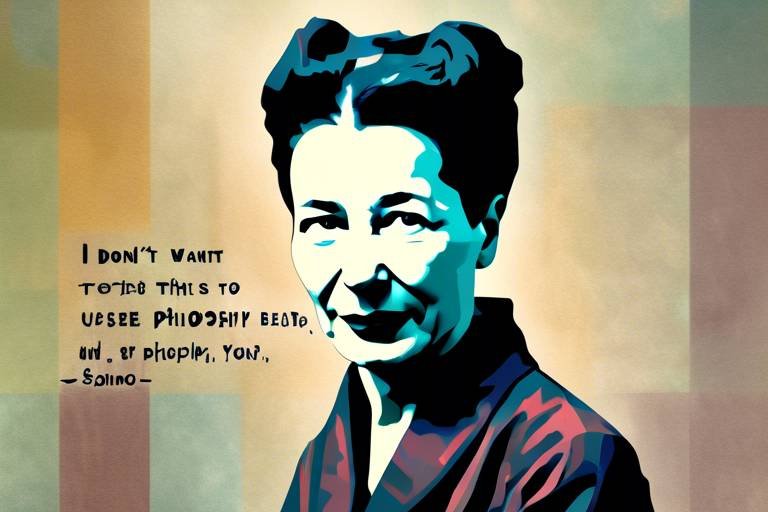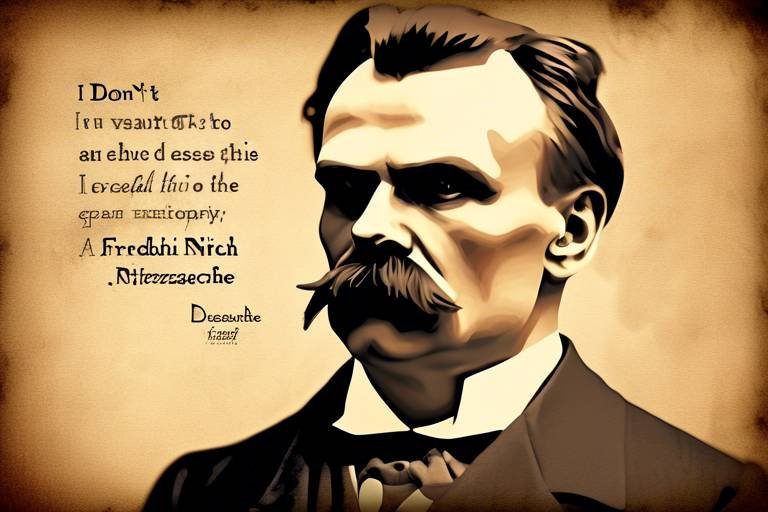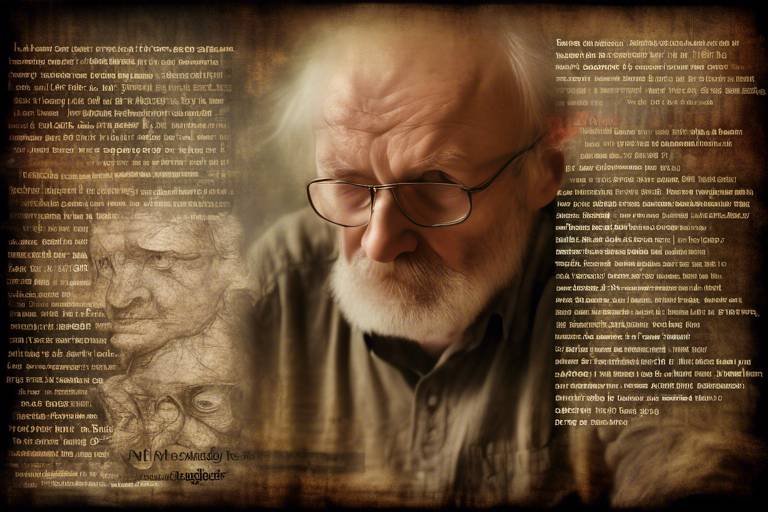Eudaimonia - The Core of Aristotle's Ethics Explained
The concept of eudaimonia is often seen as the cornerstone of Aristotle's ethical philosophy, and it invites us to explore what it truly means to live a good life. Translated as "happiness" or "flourishing," eudaimonia goes far beyond mere pleasure or momentary joy. Instead, it embodies a profound sense of fulfillment that arises from living a life of virtue and purpose. Imagine climbing a mountain; the summit represents eudaimonia, and the journey to get there is paved with the choices we make and the virtues we cultivate. This article will delve into the intricate layers of eudaimonia, examining its significance, implications, and how it shapes our understanding of human flourishing and moral virtue.
At its core, eudaimonia emphasizes the importance of living a life aligned with our reason and purpose. Aristotle believed that every human action ultimately aims at some good, and eudaimonia is the highest good that we can aspire to achieve. It’s not just about fleeting moments of happiness; rather, it’s about creating a life that reflects our values and aspirations. Think of eudaimonia as the ultimate destination on a long and winding road; the journey is filled with choices that define who we are and how we engage with the world around us. To truly understand eudaimonia, we must consider the role of virtue and how it intertwines with our daily lives.
Aristotle posits that virtue is essential for achieving eudaimonia. Virtue is not merely about adhering to a set of rules; it’s about developing a character that embodies moral and intellectual excellence. Moral virtues, such as courage, temperance, and justice, are pivotal in shaping our character and guiding our ethical decision-making. They serve as the compass that directs our actions towards the greater good. Without these virtues, the pursuit of eudaimonia can become misguided, leading us astray from our true potential.
Moral virtues, such as courage and temperance, play a crucial role in achieving eudaimonia. These virtues are not innate but rather developed through practice and habituation. For instance, when we consistently choose to act courageously in the face of fear, we cultivate a character that embodies bravery. This subsection examines how these virtues shape character and influence ethical decision-making. The more we practice these virtues, the more they become a part of who we are, leading us closer to the state of flourishing that eudaimonia represents.
A key aspect of Aristotle's ethical framework is the Doctrine of the Mean, which suggests that virtue lies between extremes. For example, courage is the mean between recklessness and cowardice. This section discusses how finding balance fosters moral excellence and contributes to overall well-being. By recognizing that each virtue requires moderation, we can navigate life's challenges more effectively, making choices that align with our pursuit of eudaimonia.
Habituation is vital in developing moral virtues. It refers to the process of becoming accustomed to certain behaviors through repetition. This part explores how repeated actions and choices cultivate virtuous habits that lead to eudaimonia. When we make virtuous choices consistently, we reinforce our character and create a solid foundation for ethical living. Just as a musician practices scales to master their instrument, we must practice virtue to refine our character and enhance our journey towards flourishing.
While moral virtues are essential, intellectual virtues such as wisdom and understanding are equally important. These virtues guide our ethical behavior and enhance our pursuit of eudaimonia. Wisdom allows us to discern the right course of action, while understanding helps us grasp the complexities of human experience. This subsection highlights their role in guiding ethical behavior and enhancing one's pursuit of eudaimonia. When we cultivate both moral and intellectual virtues, we create a well-rounded approach to living a fulfilling life.
The relationship between eudaimonia and the concept of the good life is profound. Eudaimonia is not just about achieving personal happiness; it encompasses fulfilling one's potential and purpose. This section discusses how fulfilling one's potential and purpose leads to true happiness. It’s about recognizing the unique gifts we bring to the world and using them to contribute positively to our communities and relationships. In this way, eudaimonia becomes a shared journey, where personal growth aligns with the well-being of others.
While virtues are crucial, external goods such as wealth, health, and friendships also influence eudaimonia. This subsection examines how these external factors support or hinder one's pursuit of happiness. For instance, having supportive relationships can enhance our sense of belonging and fulfillment, while good health allows us to engage fully in life’s experiences. However, it’s essential to remember that these external goods should complement, not replace, the internal virtues we cultivate.
Aristotle believed that eudaimonia is not just an individual pursuit but is also connected to the community. This part discusses how social relationships and civic engagement contribute to personal flourishing. Our connections with others enrich our lives and provide a support system that fosters growth and development. By actively participating in our communities, we not only enhance our own eudaimonia but also contribute to the flourishing of those around us.
- What is eudaimonia? Eudaimonia is a Greek term often translated as happiness or flourishing, representing the highest good in human life.
- How do virtues relate to eudaimonia? Virtues are essential for achieving eudaimonia as they shape our character and guide our ethical decisions.
- Can eudaimonia be achieved alone? While personal effort is crucial, eudaimonia is also interconnected with community and social relationships.
- What role do external goods play in eudaimonia? External goods such as health and friendships can support the pursuit of eudaimonia but should not replace internal virtues.

Understanding Eudaimonia
Eudaimonia, often translated as happiness or flourishing, is a concept that goes far beyond mere pleasure or transient joy. It is the zenith of human existence according to Aristotle, encapsulating the idea of living a life that is rich with meaning and purpose. Imagine eudaimonia as a garden; it requires careful tending, nurturing, and the right conditions to thrive. Just as a garden needs sunlight, water, and fertile soil, our lives require virtue, reason, and a sense of community to truly flourish.
At its core, eudaimonia is about realizing one's potential and living in accordance with one's true nature. Aristotle believed that every being has a specific function, and for humans, that function is rational activity in accordance with virtue. To put it simply, eudaimonia is not just about feeling good; it's about being good. It invites us to ask ourselves profound questions: Are we living authentically? Are we making choices that align with our values? Are we contributing positively to the world around us?
In this pursuit of eudaimonia, Aristotle emphasizes the importance of virtue. Virtue is not an abstract concept but a practical guide that shapes our actions and decisions. It’s the compass that helps navigate the complexities of life. Think of virtues as the building blocks of character—courage, temperance, justice, and wisdom. Each of these virtues plays a vital role in achieving eudaimonia, as they foster a life that is not only fulfilling but also ethically sound.
Moreover, eudaimonia is inherently social. It’s not just a solitary journey; rather, it flourishes within the context of relationships and community. Just as no garden can thrive in isolation, human beings cannot achieve true happiness without the support and interaction of others. Aristotle argued that our connections with family, friends, and society at large are integral to our well-being. The more we cultivate these relationships, the more we enrich our own lives and the lives of those around us.
In summary, understanding eudaimonia involves recognizing it as a multidimensional concept that encompasses virtue, reason, and community. It challenges us to reflect on our lives and strive for a deeper, more meaningful existence. So, the next time you think about what it means to be happy, remember that true happiness is not just about fleeting moments of joy; it’s about living a life of purpose, integrity, and connection.

happiness
This article delves into the concept of eudaimonia, a central theme in Aristotle's ethical philosophy, exploring its significance, implications, and how it shapes human flourishing and moral virtue.
Eudaimonia, often translated as or flourishing, is a multifaceted concept in Aristotle's ethics, emphasizing the importance of living a virtuous life in accordance with reason and purpose.
Aristotle posits that virtue is essential for achieving eudaimonia. This section explores how moral and intellectual virtues contribute to a well-rounded and fulfilling life.
Moral virtues, such as courage and temperance, play a crucial role in achieving eudaimonia. This subsection examines how these virtues shape character and influence ethical decision-making.
Aristotle's Doctrine of the Mean suggests that virtue lies between extremes. This section discusses how finding balance fosters moral excellence and contributes to overall well-being.
Habituation is vital in developing moral virtues. This part explores how repeated actions and choices cultivate virtuous habits that lead to eudaimonia.
Intellectual virtues, including wisdom and understanding, are equally important. This subsection highlights their role in guiding ethical behavior and enhancing one's pursuit of eudaimonia.
This section discusses the relationship between eudaimonia and the concept of the good life, emphasizing how fulfilling one's potential and purpose leads to true happiness.
While virtues are crucial, external goods such as wealth, health, and friendships also influence eudaimonia. This subsection examines how these external factors support or hinder one's pursuit of happiness.
Aristotle believed that eudaimonia is not just an individual pursuit but is also connected to the community. This part discusses how social relationships and civic engagement contribute to personal flourishing.
When we talk about , it's essential to understand that it's not merely a fleeting emotion or a momentary high. Instead, it's a profound state of being that encompasses a sense of fulfillment and purpose. Aristotle viewed happiness as the ultimate goal of human life, a culmination of living virtuously and achieving one's potential. Think of happiness as a garden; it requires nurturing, patience, and the right conditions to thrive. Just as a garden flourishes with care, our happiness blossoms when we cultivate virtues and engage meaningfully with the world around us.
Aristotle emphasizes that happiness is not an isolated experience. It emerges from our interactions with others, our contributions to society, and our ability to reason and reflect. In this light, happiness is deeply intertwined with our relationships and our community. Imagine trying to enjoy a delicious meal alone; it may satisfy your hunger, but sharing that meal with friends elevates the experience. Similarly, happiness increases when shared with others, creating a ripple effect that enhances collective well-being.
Moreover, happiness is often viewed through the lens of contentment and gratitude. When we appreciate what we have rather than constantly striving for more, we open ourselves to a more profound sense of joy. This perspective shift allows us to recognize the beauty in our everyday lives, transforming mundane moments into sources of happiness. In essence, happiness is a journey, not a destination. It's about embracing the process of living fully, learning from experiences, and nurturing our inner selves.
- What is eudaimonia? Eudaimonia is a Greek term often translated as happiness or flourishing, representing the highest human good achieved through virtuous living.
- How does virtue relate to happiness? Virtue is essential for eudaimonia, as it shapes our character and guides us toward ethical decision-making, ultimately leading to a fulfilling life.
- Can happiness be achieved alone? While individual actions contribute to happiness, Aristotle believed that social relationships and community engagement are crucial for achieving true eudaimonia.
- What role do external goods play in happiness? External goods, such as wealth and health, support the pursuit of happiness but are not sufficient on their own; virtues are necessary for lasting fulfillment.

or
This article delves into the concept of eudaimonia, a central theme in Aristotle's ethical philosophy, exploring its significance, implications, and how it shapes human flourishing and moral virtue.
Eudaimonia, often translated as happiness or flourishing, is a multifaceted concept in Aristotle's ethics, emphasizing the importance of living a virtuous life in accordance with reason and purpose. Imagine eudaimonia as the ultimate destination on a map of life—a place where joy, fulfillment, and moral integrity intersect. It’s not just about fleeting moments of happiness but about achieving a deep, lasting sense of well-being that transcends the ordinary. In Aristotle's view, this state of flourishing is the highest good that humans can achieve, and it requires a harmonious balance of virtues, both moral and intellectual.
Aristotle posits that virtue is essential for achieving eudaimonia. This section explores how moral and intellectual virtues contribute to a well-rounded and fulfilling life. Virtues act as the guiding compass that directs our actions and decisions, aligning them with our ultimate purpose. Without virtue, our journey toward eudaimonia can become chaotic and aimless, much like a ship without a rudder. Aristotle emphasizes that cultivating these virtues is not a one-time event but a lifelong process of growth and self-discovery.
Moral virtues, such as courage and temperance, play a crucial role in achieving eudaimonia. This subsection examines how these virtues shape character and influence ethical decision-making. Moral virtues are like the sturdy pillars of a house; they provide strength and stability to our character. For instance, courage allows us to face challenges head-on, while temperance helps us maintain balance in our desires and actions. By nurturing these virtues, we can make choices that align with our values and lead us closer to a flourishing life.
Aristotle's Doctrine of the Mean suggests that virtue lies between extremes. This section discusses how finding balance fosters moral excellence and contributes to overall well-being. Picture a tightrope walker skillfully balancing between two high points; this is how Aristotle views the practice of virtue. For example, courage is the mean between recklessness and cowardice. By striving for this balance, we not only cultivate our moral character but also enhance our ability to navigate life's complexities with grace and poise.
Habituation is vital in developing moral virtues. This part explores how repeated actions and choices cultivate virtuous habits that lead to eudaimonia. Just like a musician perfects their craft through practice, we can cultivate virtues through consistent, intentional actions. Aristotle believed that by regularly choosing to act virtuously, we develop habits that shape our character over time. This process of habituation transforms our initial impulses into second nature, making virtuous living an integral part of who we are.
Intellectual virtues, including wisdom and understanding, are equally important. This subsection highlights their role in guiding ethical behavior and enhancing one's pursuit of eudaimonia. While moral virtues lay the groundwork for our actions, intellectual virtues illuminate the path forward. Wisdom, for instance, enables us to discern the right course of action in complex situations, while understanding deepens our appreciation of the world around us. Together, these virtues enrich our lives and empower us to make choices that reflect our highest aspirations.
This section discusses the relationship between eudaimonia and the concept of the good life, emphasizing how fulfilling one's potential and purpose leads to true happiness. To Aristotle, the good life is not merely about pleasure or material success; it’s about realizing our full potential as human beings. This realization comes from a commitment to virtuous living, where our actions resonate with our values and contribute to the greater good. When we align our lives with our true purpose, we unlock the door to a life filled with meaning and satisfaction.
While virtues are crucial, external goods such as wealth, health, and friendships also influence eudaimonia. This subsection examines how these external factors support or hinder one's pursuit of happiness. Imagine trying to build a beautiful garden; while the seeds (virtues) are essential for growth, the soil (external goods) must also be fertile. A certain level of material wealth can provide the resources we need to pursue our goals, while strong friendships offer support and encouragement on our journey. However, it's essential to remember that these external goods should complement, not replace, our pursuit of virtue.
Aristotle believed that eudaimonia is not just an individual pursuit but is also connected to the community. This part discusses how social relationships and civic engagement contribute to personal flourishing. Think of eudaimonia as a vibrant tapestry, where each thread represents an individual’s contributions to the community. Our relationships with others enrich our lives and provide a sense of belonging that is vital for our overall well-being. Engaging in community life, helping others, and fostering social connections are all integral to achieving eudaimonia, as they reflect our interconnectedness as human beings.
- What is eudaimonia? Eudaimonia is often translated as happiness or flourishing, representing the highest human good achieved through a life of virtue.
- How does virtue relate to eudaimonia? Virtue is essential for eudaimonia, as it guides our actions and decisions toward achieving a fulfilling and meaningful life.
- Are external goods necessary for eudaimonia? While virtues are crucial, external goods like health and friendships can support our pursuit of eudaimonia, but they should not be the sole focus.
- What role does community play in eudaimonia? Community and social relationships are vital for eudaimonia, as they provide support, belonging, and opportunities for civic engagement.

flourishing,
This article delves into the concept of eudaimonia, a central theme in Aristotle's ethical philosophy, exploring its significance, implications, and how it shapes human flourishing and moral virtue.
Eudaimonia, often translated as happiness or flourishing, is a multifaceted concept in Aristotle's ethics, emphasizing the importance of living a virtuous life in accordance with reason and purpose.
Aristotle posits that virtue is essential for achieving eudaimonia. This section explores how moral and intellectual virtues contribute to a well-rounded and fulfilling life.
Moral virtues, such as courage and temperance, play a crucial role in achieving eudaimonia. This subsection examines how these virtues shape character and influence ethical decision-making.
Aristotle's Doctrine of the Mean suggests that virtue lies between extremes. This section discusses how finding balance fosters moral excellence and contributes to overall well-being.
Habituation is vital in developing moral virtues. This part explores how repeated actions and choices cultivate virtuous habits that lead to eudaimonia.
Intellectual virtues, including wisdom and understanding, are equally important. This subsection highlights their role in guiding ethical behavior and enhancing one's pursuit of eudaimonia.
This section discusses the relationship between eudaimonia and the concept of the good life, emphasizing how fulfilling one's potential and purpose leads to true happiness.
While virtues are crucial, external goods such as wealth, health, and friendships also influence eudaimonia. This subsection examines how these external factors support or hinder one's pursuit of happiness.
Aristotle believed that eudaimonia is not just an individual pursuit but is also connected to the community. This part discusses how social relationships and civic engagement contribute to personal flourishing.
Flourishing is a term that encapsulates the essence of eudaimonia, representing a state of thriving and prospering in various aspects of life. Imagine a garden in full bloom; each flower represents a different facet of our existence—relationships, work, health, and personal growth. Just as a garden requires the right conditions to flourish, so do we as individuals. Aristotle believed that flourishing is not merely about experiencing pleasure or avoiding pain; it’s about achieving a deeper sense of fulfillment through the practice of virtue.
In Aristotle's view, flourishing involves a harmonious balance between our inner virtues and the external circumstances that surround us. It’s like a symphony where each instrument plays its part in creating a beautiful melody. When we engage in virtuous actions, we cultivate our character, which in turn enhances our capacity to flourish. This process is not instantaneous; rather, it requires consistent effort, self-reflection, and a commitment to personal growth.
To truly flourish, one must embrace a life of purpose and meaning. This involves:
- Identifying personal values and aligning actions with them
- Building and nurturing meaningful relationships
- Engaging in activities that promote growth and learning
- Contributing to the well-being of others and the community
Ultimately, flourishing is about realizing our potential and making the most of our unique capabilities. Just as a tree grows towards the sunlight, we too must seek out opportunities that allow us to blossom and thrive. By understanding and practicing the principles of eudaimonia, we can pave the way for a life filled with joy, purpose, and fulfillment.
- What is eudaimonia? Eudaimonia is often translated as happiness or flourishing and represents the highest human good in Aristotle's ethical philosophy.
- How do virtues contribute to eudaimonia? Virtues are essential for achieving eudaimonia as they shape our character and guide our actions towards a fulfilling life.
- Can external goods affect eudaimonia? Yes, while virtues are crucial, external goods like wealth, health, and friendships also play a significant role in achieving eudaimonia.
- Is flourishing an individual or community pursuit? Flourishing is both an individual pursuit and a communal one; social relationships and civic engagement are vital for personal flourishing.

is a multifaceted concept in Aristotle's ethics, emphasizing the importance of living a virtuous life in accordance with reason and purpose.
Eudaimonia, often translated as happiness or flourishing, is a multifaceted concept in Aristotle's ethics, emphasizing the importance of living a virtuous life in accordance with reason and purpose. Imagine eudaimonia as a garden: it requires the right conditions, care, and nurturing to blossom. Aristotle believed that true happiness is not merely a fleeting emotion but a state of being achieved through the practice of virtue. This means that to attain eudaimonia, one must engage deeply with their own moral compass, making choices that reflect their values and intentions.
At its core, eudaimonia is about fulfilling one's potential. It's about realizing who you are meant to be and living in alignment with that vision. This alignment is not just a matter of personal satisfaction; it resonates within the broader context of society. When individuals pursue their purpose with integrity and virtue, they contribute positively to the community, creating a ripple effect of flourishing that extends beyond the self. Thus, eudaimonia is not an isolated pursuit but a collective journey toward a more virtuous and meaningful existence.
Aristotle posits that virtue is essential for achieving eudaimonia. This section explores how moral and intellectual virtues contribute to a well-rounded and fulfilling life. Virtue, in this sense, is not merely about adhering to societal norms; it is about cultivating an inner strength that guides one's actions and decisions. By embodying virtues such as courage, honesty, and compassion, individuals create a solid foundation for their lives, enabling them to navigate challenges with grace and integrity.
Moral virtues, such as courage and temperance, play a crucial role in achieving eudaimonia. This subsection examines how these virtues shape character and influence ethical decision-making. For instance, courage allows individuals to confront fears and take risks, while temperance helps them exercise self-control and moderation. By practicing these virtues consistently, people not only enhance their own lives but also inspire those around them to strive for moral excellence.
Aristotle's Doctrine of the Mean suggests that virtue lies between extremes. This section discusses how finding balance fosters moral excellence and contributes to overall well-being. For example, bravery is a virtue that exists between the extremes of recklessness and cowardice. This balance is crucial because it allows individuals to respond appropriately to various situations, leading to wiser choices and ultimately to eudaimonia.
Habituation is vital in developing moral virtues. This part explores how repeated actions and choices cultivate virtuous habits that lead to eudaimonia. Aristotle believed that by consistently practicing virtues, individuals can transform their character over time. Just as a musician perfects their craft through practice, so too can one refine their moral compass through habitual actions. This process is not instantaneous; it requires patience and commitment, but the rewards are profound.
Intellectual virtues, including wisdom and understanding, are equally important. This subsection highlights their role in guiding ethical behavior and enhancing one's pursuit of eudaimonia. Wisdom, for instance, allows individuals to make informed decisions, while understanding fosters empathy and compassion. Together, these intellectual virtues complement moral virtues, creating a holistic approach to living a fulfilling life.
This section discusses the relationship between eudaimonia and the concept of the good life, emphasizing how fulfilling one's potential and purpose leads to true happiness. The good life, in Aristotle's view, is not merely about the accumulation of wealth or pleasure; it is about realizing one's potential and contributing to the greater good. This realization often requires introspection and a willingness to engage with one's values and aspirations.
While virtues are crucial, external goods such as wealth, health, and friendships also influence eudaimonia. This subsection examines how these external factors support or hinder one's pursuit of happiness. For example, strong social connections can provide emotional support, while good health enables individuals to engage fully in life. However, Aristotle cautions against overvaluing these external goods, as they are not the ultimate source of happiness.
Aristotle believed that eudaimonia is not just an individual pursuit but is also connected to the community. This part discusses how social relationships and civic engagement contribute to personal flourishing. When individuals participate in their communities, they find a sense of belonging and purpose, which enhances their overall well-being. In this way, eudaimonia becomes a shared journey, where the flourishing of one contributes to the flourishing of all.
- What is eudaimonia? Eudaimonia is often translated as happiness or flourishing, emphasizing the importance of living a virtuous life in accordance with reason and purpose.
- How does virtue relate to eudaimonia? Virtue is essential for achieving eudaimonia, as it guides individuals in making ethical decisions and living a fulfilling life.
- Can eudaimonia be achieved alone? While personal effort is important, Aristotle believed that eudaimonia is connected to the community and social relationships.
- What role do external goods play in eudaimonia? External goods such as wealth, health, and friendships can support the pursuit of eudaimonia, but they are not the ultimate source of happiness.

The Role of Virtue in Eudaimonia
When we dive into Aristotle's philosophy, we quickly discover that the concept of virtue is not just a side note; it's central to achieving eudaimonia, or what many of us might call "the good life." Virtue, in Aristotle's view, is like the compass guiding us through the complexities of life. But what does this really mean? Well, think of virtue as the foundation upon which we build our character. Without it, our lives can feel a bit like a ship lost at sea, tossed around by the waves of impulse and desire. Aristotle argues that to truly flourish, we need to cultivate both moral and intellectual virtues, as they work hand in hand to elevate our existence.
Moral virtues, such as courage, temperance, and justice, are essential for navigating the challenges we face daily. These virtues shape our character and influence our choices, steering us towards actions that not only benefit ourselves but also those around us. For instance, imagine a person who embodies courage. This individual doesn't just act bravely in the face of danger; they also inspire others to confront their fears and take action. In this way, moral virtues create a ripple effect, enhancing the collective well-being of the community.
Now, let’s delve a bit deeper into the idea of the Doctrine of the Mean. Aristotle believed that virtue lies between extremes. For example, consider the virtue of courage: it exists between the extremes of recklessness and cowardice. This balance is crucial because it encourages us to find a middle ground in our actions and decisions. When we strive for balance, we foster moral excellence, which ultimately contributes to our overall well-being. So, the next time you find yourself facing a difficult decision, ask yourself: "Am I leaning too far towards one extreme?" This self-reflection can guide you towards a more virtuous path.
But how do we develop these moral virtues? This brings us to the concept of habituation. Aristotle emphasizes that virtues are not innate; rather, they are cultivated through consistent practice and repetition. Just like a musician perfects their craft through hours of practice, we too can develop virtuous habits by making conscious choices that align with our values. For example, if we want to cultivate the virtue of generosity, we can start by making small, deliberate acts of kindness a regular part of our lives. Over time, these actions will transform into a habit, and before we know it, generosity becomes second nature.
On the other hand, we must not overlook the importance of intellectual virtues in our quest for eudaimonia. These include qualities like wisdom, understanding, and insight. While moral virtues guide our actions, intellectual virtues help us make informed decisions. They allow us to reflect on our experiences and learn from them, enhancing our ability to navigate life's complexities. For instance, a wise person doesn’t just know what is right; they also understand the nuances of a situation, enabling them to respond appropriately. This interplay between moral and intellectual virtues creates a holistic approach to achieving eudaimonia, where both the heart and mind work in harmony.
In summary, the role of virtue in eudaimonia is profound and multifaceted. By nurturing both moral and intellectual virtues, we not only enhance our own lives but also contribute to the flourishing of our communities. Virtue acts as both the compass and the map, guiding us towards a fulfilling existence. So, as you embark on your journey towards eudaimonia, remember that every small choice you make can lead to significant change, shaping not just your character, but also the world around you.

Moral Virtues
Moral virtues are the bedrock of Aristotle's vision of a fulfilling life, acting as the compass that guides our actions and decisions. These virtues, such as courage, temperance, and justice, are not merely abstract concepts; they are practical qualities that shape our character and influence our ethical choices. Imagine a world where everyone embodies these virtues—how different our interactions would be! Moral virtues help us navigate the complexities of life, ensuring that we act in ways that promote not only our own well-being but also that of others.
Aristotle emphasizes that moral virtues are developed through practice and habituation. Just as a musician becomes skilled through countless hours of practice, we too must engage in virtuous behaviors repeatedly to cultivate these qualities within ourselves. This process of habituation transforms us, allowing moral virtues to become second nature. Think about it: when you consistently choose to act with kindness, over time, kindness becomes an integral part of who you are.
To further illustrate the significance of moral virtues, consider the following examples:
- Courage: This virtue enables us to face fears and challenges head-on. It’s not the absence of fear, but the ability to act rightly in spite of it.
- Temperance: This is about moderation and self-control, helping us to avoid excess and find balance in our desires.
- Justice: Justice ensures fairness and equality in our interactions with others, promoting harmony in society.
These moral virtues are interconnected, often reinforcing one another. For instance, a courageous person is more likely to act justly, while a temperate individual is better equipped to make wise decisions. Aristotle's belief is that by embodying these virtues, we not only enhance our own lives but also contribute positively to our communities.
In conclusion, moral virtues are essential for achieving eudaimonia, as they shape our character and guide our ethical decision-making. They are the qualities that not only define us as individuals but also connect us to the greater tapestry of society. So, the next time you face a moral dilemma, remember the virtues that can guide you towards a more fulfilling and flourishing life.

The Doctrine of the Mean
Aristotle’s Doctrine of the Mean is a fundamental aspect of his ethical philosophy, illustrating how virtue is achieved through moderation and balance. Imagine trying to walk a tightrope; if you lean too far to one side, you risk falling. This metaphor beautifully encapsulates Aristotle's idea that virtue lies in finding the golden mean between two extremes. For instance, courage is a virtue, but it exists between the extremes of recklessness (excess) and cowardice (deficiency). Thus, to cultivate courage, one must not only recognize these extremes but also actively seek a balanced approach in their actions and decisions.
In practical terms, the Doctrine of the Mean suggests that each virtue has its own unique midpoint. Here’s a brief overview of some key virtues and their corresponding extremes:
| Virtue | Excess | Deficiency |
|---|---|---|
| Courage | Recklessness | Cowardice |
| Generosity | Prodigality | Stinginess |
| Temperance | Overindulgence | Insensibility |
This table highlights how Aristotle viewed virtues not as rigid absolutes but as flexible concepts that require personal judgment and context. It’s about understanding that life is rarely black and white; it’s filled with shades of gray that require us to navigate wisely. By practicing moderation, individuals can develop a well-rounded character that promotes not only personal growth but also contributes to a harmonious society.
Additionally, Aristotle emphasizes the importance of habituation in achieving this balance. It’s not enough to simply know what the mean is; one must practice it consistently until it becomes second nature. Just like learning to ride a bike, it takes time, patience, and repeated effort to find that perfect balance. Over time, these habitual actions shape our character and lead us closer to achieving eudaimonia.
In conclusion, the Doctrine of the Mean is not merely a theoretical construct; it’s a practical guide for living a virtuous life. By understanding and applying this doctrine, individuals can navigate the complexities of human experience, making choices that lead to true happiness and fulfillment. So, the next time you find yourself on that metaphorical tightrope, remember to seek balance and embrace the journey towards moral excellence!

Importance of Habituation
When we think about habituation, we often picture the process of getting used to something over time. But in the realm of Aristotle's ethics, habituation is much more profound; it's the cornerstone of developing moral virtues. Imagine trying to learn a new skill, like playing the guitar. At first, your fingers fumble over the strings, but with consistent practice, your movements become fluid and natural. This is exactly how habituation works in cultivating virtues. Aristotle believed that by repeatedly engaging in virtuous actions, we can shape our character and, ultimately, our destiny.
The journey toward eudaimonia—true happiness and flourishing—requires us to intentionally practice virtues until they become second nature. This concept is deeply tied to the idea that moral virtues are not innate; rather, they are cultivated through our choices and actions. For instance, if you want to develop courage, you must face fears head-on, even when it feels uncomfortable. Over time, these actions reinforce your ability to act courageously, thereby embedding this virtue within your character.
Moreover, Aristotle emphasized that habituation is not a one-time event but a continuous process. Just like maintaining a garden requires regular attention and care, so does the cultivation of virtue. If we neglect our virtuous habits, they can wither away, leading us back into a cycle of vice. Therefore, it's crucial to engage in practices that reinforce our moral compass. This can include:
- Seeking out challenging situations that require moral decision-making.
- Reflecting on our actions and their alignment with our values.
- Surrounding ourselves with individuals who embody the virtues we aspire to develop.
By actively engaging in these practices, we create a feedback loop that strengthens our moral character. Over time, as we make virtuous choices, we begin to experience the profound sense of fulfillment that comes with living in accordance with our highest values. In this way, habituation becomes a powerful tool in our quest for eudaimonia, guiding us toward a life rich in purpose and meaning.
In summary, habituation is not merely about repetition; it's about transformation. It’s the art of turning good actions into habits that define who we are. As we cultivate these habits, we not only enhance our own lives but also contribute positively to the community around us, reinforcing the interconnectedness that Aristotle cherished in his ethical framework.
- What is eudaimonia? Eudaimonia is often translated as happiness or flourishing, representing the highest good in Aristotle's ethical philosophy.
- How does habituation influence moral virtues? Habituation helps in developing moral virtues by encouraging repeated virtuous actions, which shape our character over time.
- Can virtues be developed at any age? Yes, virtues can be developed at any stage of life through conscious practice and habituation.
- Why are external goods important for eudaimonia? While virtues are crucial, external goods like wealth, health, and friendships also play a role in supporting our pursuit of happiness.
- How does community contribute to eudaimonia? Community engagement and social relationships are essential for personal flourishing, as Aristotle believed that eudaimonia is interconnected with the well-being of others.

Intellectual Virtues
When we dive into the realm of , we uncover a treasure trove of qualities that are essential for navigating the complexities of life. These virtues, such as wisdom, understanding, and insight, are not merely abstract concepts; they are the guiding lights that help us make sense of our experiences and choices. Aristotle believed that intellectual virtues are crucial in the pursuit of eudaimonia, as they enable individuals to think critically, reason soundly, and make ethical decisions that align with their true purpose.
To put it simply, intellectual virtues are like the compass that directs us toward a fulfilling life. Imagine trying to sail a ship without a compass; you might end up lost at sea. Similarly, without intellectual virtues, we can easily veer off course in our moral and ethical journeys. These virtues empower us to reflect on our actions, consider the consequences, and strive for a deeper understanding of ourselves and the world around us.
One of the most significant intellectual virtues is wisdom. Wisdom goes beyond mere knowledge; it encompasses the ability to apply knowledge judiciously in real-life situations. It allows us to discern what is truly important and to prioritize our actions accordingly. For instance, a wise person can navigate the complexities of relationships, balancing their own needs with the needs of others, ultimately leading to more harmonious interactions.
Another vital intellectual virtue is understanding. This virtue involves grasping the underlying principles and truths that govern our lives. It’s about seeing the bigger picture and recognizing how various elements interconnect. Understanding fosters empathy, enabling us to appreciate different perspectives and fostering a sense of community. In Aristotle's view, a person who possesses understanding is better equipped to contribute positively to society, thereby enhancing their own eudaimonia.
Moreover, intellectual virtues are not static; they can be cultivated and developed over time. Just as athletes train their bodies to perform better, individuals can train their minds to enhance their intellectual virtues. This process often involves:
- Engaging in critical thinking and reflection
- Seeking knowledge through reading and discussions
- Practicing self-awareness and mindfulness
In conclusion, the role of intellectual virtues in achieving eudaimonia cannot be overstated. They serve as the foundation for ethical behavior and decision-making, guiding us toward a life of purpose and fulfillment. By nurturing these virtues, we not only enrich our own lives but also contribute to the well-being of those around us. After all, a flourishing individual is one who not only seeks personal happiness but also uplifts their community through wisdom and understanding.
- What are intellectual virtues? Intellectual virtues are qualities such as wisdom and understanding that guide ethical behavior and decision-making.
- How do intellectual virtues contribute to eudaimonia? They help individuals think critically and make ethical choices, leading to a fulfilling life.
- Can intellectual virtues be developed? Yes, through practices like critical thinking, seeking knowledge, and self-awareness.

Eudaimonia and the Good Life
Eudaimonia is often intertwined with the notion of the good life, but what does that really mean? To understand this connection, we need to explore how eudaimonia transcends mere pleasure or transient happiness. Instead, it embodies a deeper sense of fulfillment and purpose that resonates throughout one’s life. Imagine eudaimonia as the ultimate destination on a journey, where the path is paved with virtues and meaningful experiences. It’s not just about reaching the destination, but how you travel along the way.
Aristotle argues that achieving eudaimonia involves realizing one's potential and living in accordance with virtue. This is where the concept of the good life comes into play; it is not merely about accumulating wealth or status but about engaging in activities that align with our true nature and values. In this sense, the good life is a holistic experience that encompasses various aspects of existence, including moral, intellectual, and social dimensions. It’s like cooking a gourmet meal – you need the right ingredients, preparation, and the right environment to truly savor the experience.
Furthermore, Aristotle emphasizes that the good life is not an isolated endeavor. It flourishes within a community. Our relationships and interactions with others significantly shape our pursuit of eudaimonia. For instance, consider the following elements that contribute to a fulfilling life:
- Meaningful Relationships: Connecting with friends and family enriches our lives and helps us grow.
- Personal Growth: Engaging in activities that challenge us fosters a sense of accomplishment and satisfaction.
- Contribution to Society: Helping others and participating in community service can provide a profound sense of purpose.
These factors illustrate that the good life is a tapestry woven from personal aspirations and social connections. When we engage in meaningful pursuits and nurture our relationships, we cultivate an environment ripe for eudaimonia. Aristotle believed that the good life is a shared experience, where the flourishing of the individual contributes to the flourishing of the community. This interconnectedness highlights that we are not solitary beings; our happiness is often tied to the happiness of those around us.
Moreover, external goods, such as health and wealth, do play a role in our journey towards eudaimonia, but they are not the end goal. Think of them as the tools that can help us build a fulfilling life; without them, the process may be more challenging, yet it doesn’t negate the importance of virtue. In essence, the good life is about balancing these external goods with internal virtues, creating a harmonious existence that fosters both personal and communal well-being.
In conclusion, the relationship between eudaimonia and the good life is a profound one. It invites us to reflect on our values, our relationships, and our contributions to society. By embracing this holistic approach, we can navigate our paths towards genuine fulfillment and happiness, ensuring that our journey is as rewarding as the destination itself.
- What is eudaimonia? Eudaimonia is a Greek term often translated as happiness or flourishing, emphasizing a life lived in accordance with virtue and purpose.
- How does virtue relate to eudaimonia? Virtue is essential for achieving eudaimonia, as it shapes our character and guides our ethical decisions.
- Can eudaimonia be achieved alone? While personal effort is crucial, eudaimonia is often enhanced through social relationships and community engagement.
- Are external goods necessary for eudaimonia? External goods like wealth and health can support the pursuit of eudaimonia, but they are not the primary focus; virtue is key.

External Goods and Eudaimonia
When we think about eudaimonia, it’s easy to get lost in the abstract notions of virtue and moral excellence. However, Aristotle reminds us that achieving true happiness isn't solely about internal character; it's also influenced by a range of external goods. These external factors—like wealth, health, and friendships—play a significant role in our pursuit of a flourishing life. Imagine trying to run a marathon without the right shoes or training; similarly, striving for eudaimonia without these external goods can be quite challenging.
Firstly, consider wealth. While Aristotle doesn’t advocate for a life of excess, he recognizes that having a certain level of financial stability can provide the necessary resources to pursue virtues and engage in meaningful activities. It’s not about hoarding riches but rather about having enough to support a life filled with purpose. Without this basic level of economic security, individuals may find themselves preoccupied with survival rather than self-actualization.
Next up is health. Good health is often taken for granted, yet it forms the foundation upon which we can build our lives. Think of it as the soil in which the seeds of virtue can grow. If the soil is poor, the plants can't thrive. Similarly, if one's health is compromised, it becomes increasingly difficult to engage in virtuous activities or pursue intellectual growth. Aristotle believed that a healthy body contributes to a healthy mind, thus allowing individuals to fully engage with their ethical responsibilities.
Then, we have friendships, which Aristotle famously emphasized as vital to a good life. Genuine friendships provide emotional support, joy, and a sense of belonging. They are the mirrors reflecting our virtues and flaws, helping us grow. Imagine navigating life’s challenges alone; it would be a lonely and daunting journey. In contrast, having friends who share our values and goals can enhance our pursuit of eudaimonia, making the journey not just bearable but enjoyable.
To encapsulate the relationship between external goods and eudaimonia, here’s a quick overview:
| External Goods | Impact on Eudaimonia |
|---|---|
| Wealth | Provides resources for pursuing virtues and engaging in meaningful activities. |
| Health | Enables individuals to engage in virtuous activities and intellectual growth. |
| Friendships | Offers emotional support and enhances the journey toward a fulfilling life. |
In conclusion, while virtues are undeniably important, we cannot overlook the significance of these external goods in our quest for eudaimonia. They act as the scaffolding that supports our moral and intellectual growth. By recognizing and nurturing these external factors, we pave the way for a richer, more fulfilling life. So, the next time you ponder the essence of happiness, remember that it’s not just about internal virtues; it’s also about the world around you and how it supports your journey.
- What is eudaimonia? Eudaimonia is often translated as happiness or flourishing and refers to a life of virtue and purpose according to Aristotle's ethics.
- How do external goods affect eudaimonia? External goods like wealth, health, and friendships provide the necessary support and resources to pursue a flourishing life.
- Are virtues enough to achieve eudaimonia? While virtues are crucial, external goods also play a significant role, making a balanced approach essential for true happiness.

The Community's Role
When we think about eudaimonia, it’s easy to get caught up in the idea that it’s solely an individual pursuit. However, Aristotle challenges this notion by emphasizing that our happiness and flourishing are intricately linked to the communities we inhabit. Just like a tree needs both sunlight and water to grow, our well-being is nourished by the relationships and social structures around us. Have you ever noticed how a supportive friend or a tight-knit community can lift your spirits? That’s the essence of Aristotle’s perspective—our quest for eudaimonia is not a solo journey but a shared experience.
In Aristotle’s view, the community plays a pivotal role in shaping our character and moral virtues. When we engage with others, we find opportunities to practice virtues like justice, kindness, and courage. It’s in the context of relationships that we learn how to navigate ethical dilemmas and cultivate a sense of belonging. Think about it: how many times have you been inspired to act virtuously by witnessing someone else’s good deeds? This ripple effect reinforces the idea that moral development is a collective effort.
Furthermore, Aristotle believed that a well-functioning community provides the necessary external goods that support individual flourishing. These external goods could include access to education, healthcare, and even the simple joys of friendship. Without these elements, the pursuit of eudaimonia becomes significantly more challenging, akin to trying to run a marathon without proper training or nutrition. In this sense, a thriving community acts as a foundation for personal growth, enabling individuals to realize their full potential.
Additionally, civic engagement is another crucial aspect of community involvement that Aristotle highlighted. Participating in community activities not only fosters a sense of belonging but also encourages individuals to contribute to the common good. Whether it’s volunteering, attending town hall meetings, or simply being an active member of a local group, these actions create a stronger bond within the community. This interconnectedness enhances the overall quality of life for everyone involved, making the pursuit of eudaimonia a shared goal.
To summarize, the role of the community in achieving eudaimonia cannot be overstated. It’s the backdrop against which our lives unfold, providing the support, resources, and relationships necessary for true happiness. Just as a gardener tends to their plants, we must nurture our communities to cultivate a flourishing environment for all. After all, as Aristotle would argue, the essence of a good life is not just about personal achievements but also about how we uplift each other along the way.
Frequently Asked Questions
- What is eudaimonia? Eudaimonia is often translated as happiness or flourishing, representing a state of living in accordance with virtue and purpose.
- How does community influence eudaimonia? Community plays a crucial role by providing support, resources, and opportunities for moral development.
- Can eudaimonia be achieved alone? While individual effort is important, Aristotle emphasizes that community engagement is vital for achieving true happiness.
- What are some examples of civic engagement? Examples include volunteering, participating in local governance, and being involved in community organizations.
Frequently Asked Questions
- What is eudaimonia in Aristotle's ethics?
Eudaimonia, often translated as happiness or flourishing, is a central theme in Aristotle's ethical philosophy. It emphasizes living a virtuous life in accordance with reason and purpose, ultimately leading to human flourishing.
- How do moral virtues contribute to eudaimonia?
Moral virtues like courage and temperance are essential for achieving eudaimonia. They shape our character and influence our ethical decision-making, guiding us toward a fulfilling life.
- What is the Doctrine of the Mean?
The Doctrine of the Mean is Aristotle's idea that virtue lies between extremes. Finding balance in our actions and choices fosters moral excellence, which is crucial for overall well-being.
- Why is habituation important in developing virtues?
Habituation is key to cultivating moral virtues. By repeatedly practicing virtuous actions and making ethical choices, we develop habits that lead us toward eudaimonia.
- What role do intellectual virtues play in eudaimonia?
Intellectual virtues, such as wisdom and understanding, guide our ethical behavior and enhance our pursuit of eudaimonia. They help us make informed decisions that align with our values.
- How are external goods related to eudaimonia?
While virtues are crucial, external goods like wealth, health, and friendships also impact eudaimonia. These factors can either support or hinder our pursuit of true happiness.
- What is the community's role in achieving eudaimonia?
Aristotle believed that eudaimonia is not just an individual pursuit; it's also connected to the community. Social relationships and civic engagement contribute significantly to personal flourishing.



















